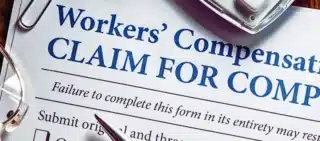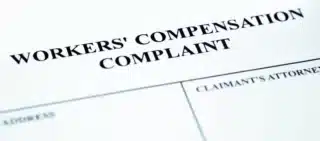
At Strong Law Offices, we have a team of workers' compensation lawyers who understand the financial setbacks and physical limitations...


If you have been injured at work, you may be looking to file a workers’ comp claim. While the process of filing a claim can be tricky enough, the process may be further complicated if you suffered your workplace injury out of state. In this situation, you will have to ensure that your policy covers you for the state in which you wish to make your claim, and follow that state’s guidelines for making a claim.
Workplace safety is a major issue. Around 2.6 million injuries and illnesses are reported annually. In situations where a worker is injured, he or she may have the option to choose from multiple jurisdictions to make a claim. It’s important to have a good understanding of where and how to file your workers’ comp claim before making a decision.

Workers' compensation will cover you if you are working out of state. However, there are factors that can impact your claim. The most significant factor is whether you are working out of state temporarily or regularly.
If your job requires you to travel for several weeks or work occasionally in a state that is not your home state, workers' compensation can still cover you for any injuries you sustain while on the job. There are two ways this can happen:
When you have extraterritorial insurance, your workers' compensation benefits from your full-time job will follow you while you work temporarily in another state. For example, if you work in Illinois full-time and receive workers' compensation benefits from Illinois, those same benefits will apply when you work temporarily in another state, like Kentucky.
Reciprocity agreements permit workers from one state to work temporarily in another state. The primary objectives of these agreements are to establish where a claim should be filed in the event of an injury, and to prevent employers from paying two separate workers' compensation insurance premiums when not legally obligated to do so.
With this type of agreement, employees can work in another state for a brief period without having to acquire workers' compensation insurance in that state. If an employee sustains an injury or illness out of state, he or she can still file a claim and receive the same workers' compensation benefits.
Not all states acknowledge workers' compensation reciprocity. Even if it is recognized, the benefits provided may vary. A reciprocity agreement may only be applicable to businesses in specific industries or for limited durations.
Furthermore, it's common for policies to offer coverage in another state for a restricted period, usually 30 days. If an employer has workers stationed out of state beyond this duration, it's advisable to purchase a separate workers' compensation policy to cover work in that particular state.
If a company has employees who reside or work outside the state on a regular basis, the employer has three choices. First, they can include the state of residence of those employees in Section 3A under Part One (Information Page) of the existing workers' compensation insurance. The primary states are listed in Section 3A, and the carrier reports the coverage to that state on behalf of the employer. Second, they can purchase a separate policy to cover those employees. Third, they can buy an “all-states” workers' compensation policy from an insurance carrier that offers such coverage.
Knowing how workers' comp works can help you prepare for your claim.
Workers' compensation, also known as “workers' comp,” is a program mandated by the government that offers benefits to employees who become sick or injured while on the job. It is essentially an insurance program for workers who may receive benefits if they suffer an injury or illness that results directly from their work. Almost every state requires companies with workers to have workers' comp coverage.
Private insurers fund most workers' compensation programs, with premiums paid by individual employers. Each state has a Workers' Compensation Board, which is a state agency that oversees the program and intervenes in disputes.
If you sustain an injury or illness while at work, workers' compensation insurance can cover a range of expenses. This includes medical care, lost income, retraining costs, disability benefits, and survivors benefits.
Many compensation plans cover medical expenses associated with work-related injuries. These include medical expenses from initial treatment, as well as medical expenses that you are likely to incur in the future.
If you need to take leave from work to recover from your injury or illness, you may receive pay for lost wages. The salary replacement paid under workers’ compensation is generally less than your full salary. The most generous programs pay around two-thirds of your gross salary. If you are unable to work in the same job, your benefits include retraining so that you can acquire a new job.
If a work-related incident results in the death of an employee, workers’ compensation will make payments to the worker’s dependents.
If you experience an injury or illness while on the job or within the scope of your employment, you may be eligible for workers' compensation benefits. This also covers occupational illnesses or diseases caused by exposure to hazardous chemicals or other dangers in the workplace. To file a claim, the following conditions must be met:
If you've been injured at work, you have 45 days from the date of the accident to inform your employer. Waiting longer than that could mean you won't be eligible for workers' compensation benefits. It's best to file your claim as soon as possible. In Illinois, you have up to three years from the date of your injury, or two years from the date of your last benefit payment, to file a workers' comp claim.
When it comes to determining which state's workers' compensation laws will apply, it depends on where you file your claim. As an employee, you are entitled to select the jurisdiction you wish to file your claim in based on one of three criteria. You can file a claim in the state where your work is principally localized, you can file a claim in the state where you were injured, or you can file a claim in the state where you live.
Even if your employer's policy covers out-of-state employees, your employer is still responsible for paying any claims entitled to you under the respective state's workers' compensation laws. While there are limits to what workers' compensation policies can cover, employers must ensure they have sufficient coverage to meet their responsibilities.
Determining the state where your job is based can be tricky if your employer has locations in multiple states. Your employer's primary location will have to be determined to decide on jurisdiction for your workers’ comp coverage. Most states consider the place where employees regularly work, reside, or spend a significant amount of their working time as their principal location.
A workers’ compensation lawyer will be able to advise you on how to determine which states you are able to file your claim in, with regard to your particular circumstances.
Knowing how to file an out-of-state workers' comp claim can make all the difference after sustaining a workplace injury. While the workers’ compensation claims process can seem complicated, it can be broken down into five basic steps.
Most states have websites on which to begin your claims process. If you are filing for workers’ comp out of state, you can begin by looking on the website of that state for the relevant information and forms pertaining to your claim.

At Strong Law Offices, we have a team of workers' compensation lawyers who understand the financial setbacks and physical limitations...

Common Equipment Involved in Run-Over Accidents Illinois job sites, from construction zones to industrial plants, depend on machinery to stay...

Why Do Employers Refuse to File Workers' Comp Claims? While most employers understand their legal obligation to report workplace injuries...